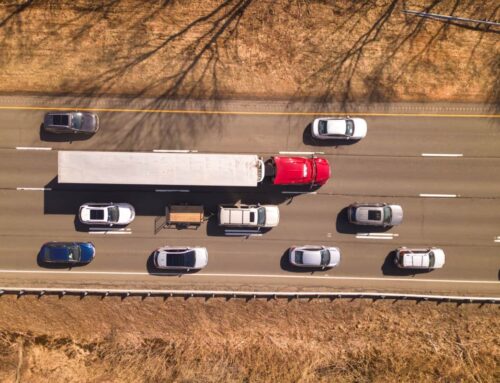The undisputed facts of the case go like this: On September 10, 2008, Alan Alegria got caught in a thunderstorm as he drove his pickup on Interstate 20 in Georgia. The rain poured. He hydroplaned and lost control of the truck. The truck spun onto the shoulder of the road before swerving back into the road and stalling out in the middle of the highway’s right lane.
Robert Howard drove a tractor-trailer, slashing eastbound through the rain. The rig belonged to a trucking company, AAA Cooper Transportation Incorporated (ACT), and he was hauling goods on a schedule. Howard charged closer and closer to Alegria’s stalled pickup.
Alegria saw Howard and his rig barreling down on him and saw that he was not making evasive maneuvers or hitting his brakes. Alegria tried to open his door to escape, but his door was jammed. He rolled down his window and frantically waved his arms and screamed for Howard to see him through the rain on the dark road.
Howard’s rig crashed into the driver’s side of the pickup. The collision demolished Alegria’s truck. His leg was crushed and had to be amputated. His shoulder was separated. His body was battered.
In 2010, Alegria filed a personal injury complaint against Howard, ACT, the trucking company, and Ace American Insurance Company (AAIC). He alleged Howard was driving too fast for conditions and for the failure to avoid the collision.
ACT and AAIC filed a countersuit against Alegria. They asserted that his actions were negligent and caused the accident and the resulting damage because he failed to maintain control of his truck.
Back in 2008, after Alegria found a personal injury attorney, a letter of spoliation was sent to Jerry Hill, ACT’s insurance claims manager. A letter of spoliation acts as a notice to the defendants in a claim to preserve any and all relevant evidence that may be material to a claim.
The letter of spoliation Hill received from Alegria’s attorney advised the trucking company to maintain and preserve the commercial truck’s post-collision condition, any Black Box computer data from the truck’s computer system, specific business records related to the tractor-trailer, the collision, Howard’s employment documents, and any and all materials related to the incident. The letter also requested all known pertinent insurance policies held by ACT, including umbrella coverage or excess liability insurance.
Here is where the story’s twist: A few days before Hill received the letter of spoliation, the claim manager sent an email to some of the employees of ACT. He informed them that he anticipated a lawsuit and wanted them to “ground” the truck involved in the accident. He also wanted ACT to send him copies of all the records related to the crash—driver logs, maintenance records, information about what the tractor-trailer was hauling when the crash occurred, and all other documents related to Howard and the tractor-trailer.
In November 2010, after an intense investigation during discovery, the Superior Court of DeKalb County found that ACT lied about and concealed evidence. They denied they had Black Box evidence from the truck’s computer system. It was revealed the evidence was destroyed.
Spoliation is the legal term for destroying evidence and creates an obstruction of justice. ACT repaired the tractor-trailer before it could be investigated. Again, obstructing the investigation. They claimed they had accidentally destroyed the driver’s logs, but later the logs appeared.
Judge Courtney L. Johnson said the trucking company’s responses “lacked credibility” and struck ACT’s defense in the lawsuit—the most severe penalty she could levy. She wrote in her decision, “The court does not believe that a company of such substantial size and means, in tandem with its learned counsel, could inadvertently make so many mistakes.”
By actively trying to hide and destroy the evidence requested to be preserved in the letter of spoliation, the trucking company was deemed at fault for the collision and Alegria’s injuries.
What Should Be in the Letter and Where Should It Be Sent?
A letter of spoliation should be clear and spell out who is the plaintiff (who is doing the suing) and the defendant (who is getting sued) in a case. The letter should request to preserve any and all relevant evidence. It should also be specific about the details of the accident, including:
- Identifying the truck’s license plate number
- Detailing the accident’s location, time, and date
- Which evidence should be preserved and how to preserve it?
A letter should get past the vague comments like any and all relevant evidence. Vague is not usually specific enough to ensure the preservation of all the evidence needed. The letter should mention not destroying, hiding, altering, or tampering with evidence. The letter should include a deadline to receive the evidence. The specific details concerning the evidence should be exact and may include:
- Driver logs
- Dispatch logs
- Inspection and maintenance reports
- Bills of lading regarding the driver and the truck
- Black Box computer records
- Employee records with a driver’s history
- Safety records
- Accident reports from the collision and any related video and photographs
- Witness statements
- Any results from drug or alcohol tests performed after the accident
- The actual truck for a specialist to inspect
The letter of spoliation could be sent to various parties related to the accident. These parties may include:
- The truck driver involved in the accident
- The trucking company managers and owners
- The trucking company’s insurance company
- The trucking company’s mechanic if the crash occurred because of a maintenance issue
Like in Alegria’s case, not all trucking companies abide by the rules of spoliation. Evidence often gets destroyed or obfuscated. When this happens, the law is on the side of the letter sender.
If deceit and malice occur, trucking companies may lose the case because of it, and sometimes, they can face sanctions which will hurt business and keep them from this offensive happening in the future.








